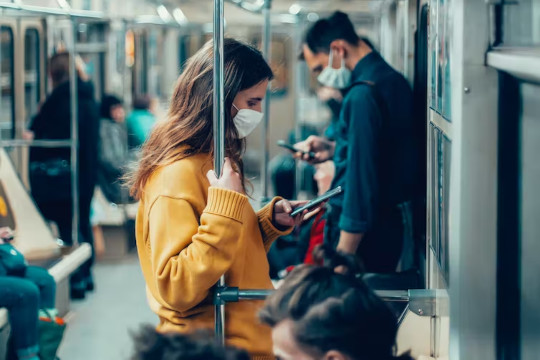After a COVID infection, whether it’s a first, second, or even a third, many of us wonder how long we might be protected against a reinfection, and whether we’ll be susceptible to new variants. Also, if we do catch COVID again, will the immunity we’ve acquired from this infection reduce the severity of the next one?
A new study published in The Lancet set out to answer these questions, looking at the strength and duration of natural immunity by COVID variant.
The authors collected data from 65 studies across 19 countries, making it the largest review on this topic to date. These studies compared COVID risk among people who had been infected previously and those without a prior infection. Studies looking at natural immunity in combination with vaccination (hybrid immunity) were excluded.
The researchers aimed to assess if infection induced similar protection against reinfection with different variants, and if this waned differently over time.
Get The Latest By Email
The analyses spanned studies from the beginning of the pandemic until September 2022, and looked primarily at the alpha, beta, delta and omicron BA.1 variants.
Protection from reinfection
The authors evaluated protection against reinfection, symptomatic disease, and severe disease (defined as hospitalisation or death) separately.
They found previous infection was highly protective against reinfection with alpha, beta and delta variants, but less so against omicron BA.1. A previous infection provided moderate protection from reinfection with omicron BA.1 (45%), compared with stronger protection against pre-omicron variants (82%). This was also the case for symptomatic infection.
Data from long-term studies showed that protection against reinfection for pre-omicron variants dropped to 78.6% over 40 weeks, whereas for omicron BA.1 it dropped more rapidly to 36.1%.
When assessing severe disease, however, all variants showed sustained protection above 88% for 40 weeks. This isn’t to say that protection drops substantially after 40 weeks. Rather, it seems there was limited data available that followed people for long enough for the authors to be able to draw strong conclusions beyond this time frame.
The results also revealed that protection against severe disease after natural infection was comparable to that received from two vaccine doses, for both pre-omicron and omicron BA.1 variants.
Making sense of the findings
A couple of years is a long time for highly contagious respiratory viruses, and SARS-CoV-2 (the virus that causes COVID) has been no different. It has generated sequential variants of concern, with increased transmissibility and capacity to evade our immune responses compared with the ancestral virus.
The study’s observations, which treat protection against pre-omicron variants and omicron BA.1 separately, make sense when we consider how omicron variants differ from their predecessors.
By way of background, neutralising antibodies generated after previous viral infection are important to prevent subsequent virus entry to susceptible cells. These Y-shaped molecules recognise intact proteins of the virus exterior and attach to them, preventing the virus from latching on to the cell receptor necessary for infection.
But to persist, viruses like SARS-CoV-2 introduce random mutations in their genome when they replicate, aiming to continuously alter their proteins to escape immune recognition.
Omicron lineages have enough mutations to differentiate substantially from previous variants, and therefore evade existing antibodies. Evasion from neutralising antibodies explains our failure to control reinfection by omicron variants.
Thankfully, we don’t just rely on antibodies for protection. A type of immune cells called T cells recognise snippets of virus proteins rather than intact proteins. This means it would take many more mutations in the virus genome to completely evade T cell immunity.
Unlike antibodies, T cells don’t seek out viruses. Instead they recognise infected cells and rapidly eliminate them to reduce virus factories in the body. T cells therefore act where neutralising antibodies may have failed, after infection. A robust T cell response to coronaviruses is crucial to prevent severe disease, and fortunately, tougher for omicron to evade.
SARS-CoV-2-specific T cells wane more slowly than antibodies. In fact, people infected with the similar coronavirus SARS in 2003 still had T cells which recognise SARS-CoV-2 17 years after infection.
Infection versus vaccination
While a natural infection may offer equivalent protection to vaccination, this is not to say you should seek to become infected. SARS-CoV-2 remains a dangerous and unpredictable virus which can, in some cases, cause a host of damaging effects that linger long after recovery.
The authors suggest a person’s previous infection status and timing should be considered alongside their booster vaccinations to predict protection. However, this may be difficult to implement as infection surveillance has decreased in most countries compared with earlier in the pandemic. In any case, COVID certificates are used less commonly now.
They also suggest their findings could be used to inform the optimal timing for booster vaccination strategies. That is, there’s probably merit in waiting some time after an infection before getting a booster.
Further high quality, long-term follow up studies will be important to supplement these findings, as the authors acknowledge there are not as many studies on natural infection compared with protection after vaccination. There were also few studies mapping protection against newer omicron sublineages. As the pandemic continues, there remains much to learn about immune protection against this evolving virus.
About the Author
![]()
Zania Stamataki, Associate Professor in Viral Immunology, University of Birmingham
This article is republished from The Conversation under a Creative Commons license. Read the original article.
books_health








